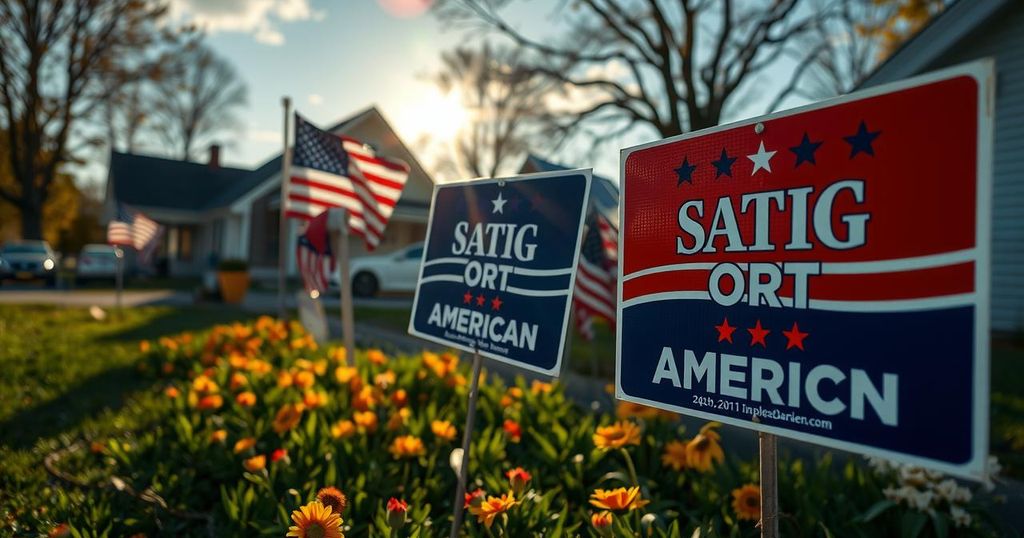Through My Lens: The Significance of Yard Signs in American Elections

The article recounts the author’s experiences as a newcomer to America during the election season, focusing on the cultural significance of yard signs. It contrasts this phenomenon with political expressions in other countries, such as Kenya, emphasizing the accessibility and personal resonance of American yard signs. Through this reflection, the author celebrates their transition from observer to active participant in democracy, symbolizing empowerment and civic engagement.
As a recent immigrant in America, specifically in Maine, the election season unfolds with both surprises and fascinations that differ significantly from what I have encountered globally. This marks my second presidential election, and I find myself reflecting on the stark contrasts compared to elections in other countries. My inaugural voting experience in 2020, amidst the competition between Donald Trump and Joe Biden, was a tumultuous blend of anxiety and exhilaration. With another election approaching, I am once again caught in the tension of anticipating the results while relishing the act of casting my vote. Among the most intriguing elements of American elections is the widespread culture of yard signs. In my recent observations driving through Maine, these signs have become conspicuously prevalent, much like blossoming flowers signaling the arrival of spring during election season. They offer me an accessible means to familiarize myself with local candidates vying for positions from school boards to congressional seats. Moreover, they provide an implicit understanding of the political affiliations within my neighborhood; some residents showcase signs for their preferred presidential candidates while others display their party loyalties. This year, I have embraced this quintessential American tradition by prominently placing a Harris-Walz sign in my yard, while my neighbors exhibit their support for Trump-Vance. There is an oddly satisfying pleasure in navigating the streets, counting the array of signs, transforming it into an engaging pastime. This method serves as a potent, yet understated, approach for individuals to articulate their political sentiments, a practice I had not encountered in my prior experiences abroad. Reflecting on my time residing in Nairobi, Kenya, during a presidential election, the absence of yard signs was striking. Instead, one would find towering billboards and large banners featuring candidates’ images dominating the urban landscape, often lacking the personal resonance of the yard signs I now observe in the United States. Here, yard signs feel like an extension of individual identity, a visible proclamation of support that communicates to the community, “I endorse this candidate, and I wish for you to recognize my position.” What resonates profoundly with me is the informal, accessible nature of this tradition. In the United States, expressing one’s opinion does not require affiliation with a political elite; a humble yard sign can convey a message as powerfully as a large-scale campaign rally. It serves as an evocative reminder that in America, every voice is significant, and individuals do not require significant resources to assert their opinions regarding the future of their community and nation. For me, these signs symbolize more than mere political endorsements; they encapsulate the very essence of democracy—a tangible indication of the hard-earned rights I now possess as a citizen. In many regions of the world, elections provoke apprehension and strife. However, here in the United States, despite the commonplace stresses associated with the electoral process, there exists a prevailing atmosphere of liberty, empowerment, and pride. I now partake in a system that not only empowers me to vote but also allows me to express my views through the simplicity of a sign in my yard. Although election cycles in the U.S. are extended and taxing, the accompanying anticipation, excitement, and occasional anxiety represents a uniquely American experience. This environment fosters public participation, discussion, and healthy debate. I find it both awe-inspiring and encouraging that this nation has cultivated a landscape conducive to such overt civic engagement. As I prepare for my second presidential election, I carry forward the insights gleaned from my initial experience—patience, optimism, and an understanding of the importance of my vote. The yard sign in my front yard may appear inconsequential, yet it embodies my personal journey—from an observer to an active participant in the democratic process—a truly significant transition for me.
This narrative explores the author’s experience as a newcomer to America, specifically during the election season in Maine. It contrasts American election customs, particularly yard signs, with other countries’ practices. Particularly highlighting the personal engagement and accessibility of expressing political views in the U.S., it underscores the empowerment associated with participating in the democratic process. The author reflects on their journey from an immigrant to a proud participant in American democracy, adding depth to the cultural significance of local electoral engagement.
In conclusion, the author’s exploration of American election yard signs reveals a profound appreciation for this unique form of civic engagement. Through their observations, the signs emerge as not just political advertisements, but as symbols of democracy and individual expression. This personal journey illustrates the transformative power of participation in the electoral process, reinforcing the notion that every individual’s voice matters in shaping the future of their community and country.
Original Source: www.pressherald.com






